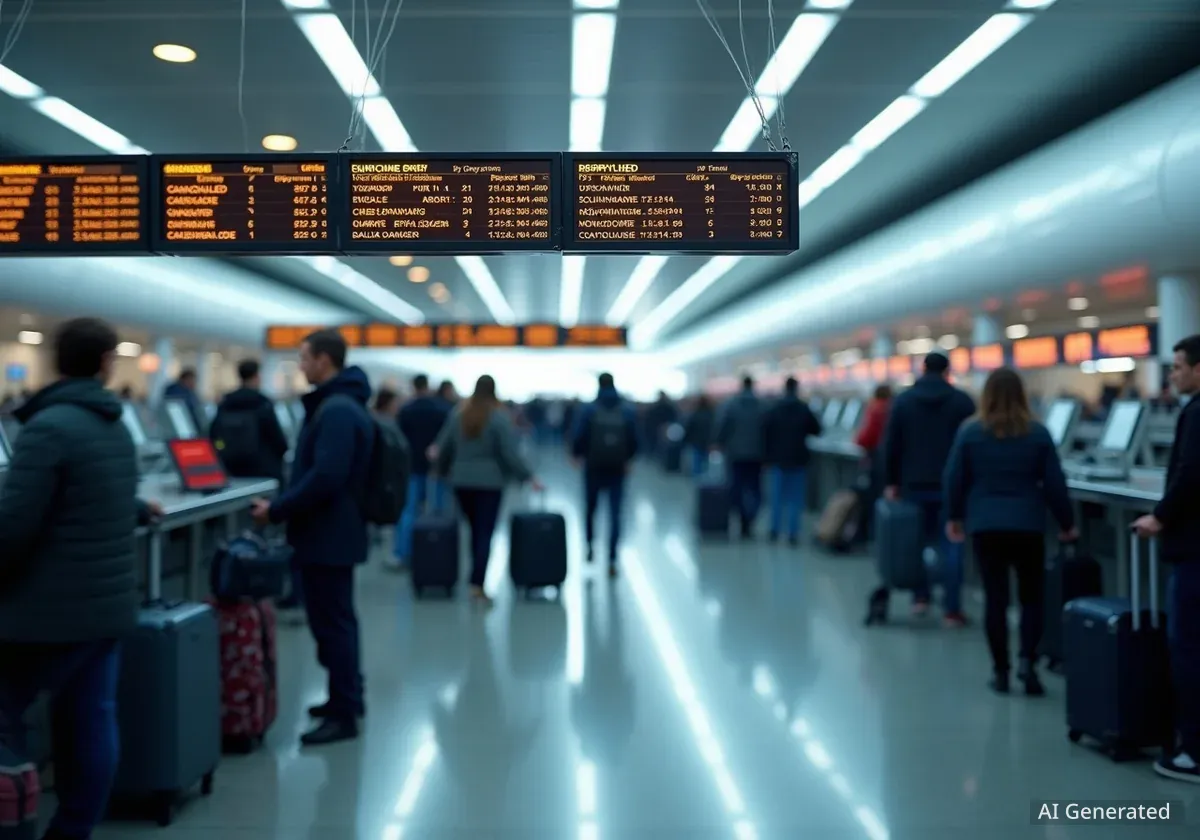Thousands of airline passengers across the United States are experiencing significant travel disruptions. Major airlines have canceled 98 flights, impacting key routes and leaving many travelers stranded. These cancellations affect both domestic and regional services, leading to widespread frustration and delays at airports nationwide.
Key Takeaways
- 98 flights canceled by five major airlines.
- 3,128 flights delayed across the US and internationally.
- Key routes like Boston to New York are heavily impacted.
- Operational issues and adverse weather are primary causes.
- Travelers advised to check flight status and seek rebooking.
Widespread Impact on US Air Travel
Five airlines have canceled a total of 98 flights. These carriers include Cape Air, Alaska Airlines, Breeze Airways, Republic Airlines, and American Airlines. The cancellations have created major problems for travelers on various routes.
Routes between Boston, Fort Lauderdale, Martha’s Vineyard, Nantucket, and New York are particularly affected. This shows a broad impact on both short-distance and longer domestic journeys. Many passengers are now looking for new flights, facing long waits, or having their trips completely called off.
Cancellation Statistics
- Total flights canceled: 98
- Total flights delayed: 3,128
- Airlines involved: Cape Air, Alaska Airlines, Breeze Airways, Republic Airlines, American Airlines
Major Airports Affected by Disruptions
The current flight issues are impacting several major airports across the country. These hubs are critical for both domestic and international travel. The disruptions are causing delays and affecting passenger movements.
Airports like New York’s John F. Kennedy International Airport (JFK) and San Francisco International Airport (SFO) are among those experiencing significant problems. Miami International Airport (MIA) and Charlotte Douglas International Airport (CLT) also report heavy impacts. These are key centers for air traffic.
Other affected locations include Hartsfield-Jackson Atlanta International Airport (ATL), Washington Dulles International Airport (IAD), and Houston Bush Intercontinental Airport (IAH). Seattle-Tacoma International Airport (SEA) is also facing challenges. Even airports in Alaska, such as Anchorage International Airport (ANC), Petersburg, and Juneau, are seeing disruptions.
"The ripple effect of these cancellations is causing chaos at major airports, leaving many passengers frustrated and stranded," a travel industry observer noted.
Background on Flight Disruptions
Flight cancellations and delays are common issues in air travel. They can stem from various factors including mechanical problems, crew shortages, air traffic control restrictions, and severe weather. Airlines work to manage these issues but widespread disruptions can be complex to resolve quickly.
Reasons for Travel Setbacks
The exact reasons for each cancellation are not always made public immediately. However, airlines attribute the current problems to a mix of operational issues and logistical challenges. These can include unexpected aircraft maintenance needs or crew scheduling conflicts.
Adverse weather conditions are also playing a role. Weather can affect flight paths, airport operations, and aircraft availability. These combined factors make it difficult for passengers to reach their destinations on schedule. Airlines are working to address these issues and provide solutions.
The disruptions are not limited to the US. International airports, such as London Heathrow, are also experiencing effects. Travelers from different countries are seeing their journeys altered due to these widespread problems. This highlights the interconnected nature of global air travel.
Steps for Affected Passengers
- Check Flight Status: Passengers should monitor their flight status regularly through airline websites or apps.
- Contact Airline: Reach out to the airline for rebooking options or information on compensation.
- Explore Alternatives: Look into other flight times or alternative modes of transport if necessary.
- Document Everything: Keep records of flight numbers, cancellation notices, and any expenses incurred.
Airline Efforts and Passenger Advice
Airlines are working to minimize the impact of these disruptions. They are offering rebooking options and, in some cases, compensation to affected passengers. The goal is to help travelers reach their destinations, even if it means delays.
Passengers are advised to remain patient and proactive. Staying informed about flight changes is crucial for making alternative travel arrangements. Checking flight status as early as possible can help avoid further complications.
According to travel experts, understanding airline policies for delays and cancellations is important. This knowledge can help passengers navigate the rebooking process and understand their rights regarding compensation. The current situation requires travelers to be prepared for potential changes to their plans.





